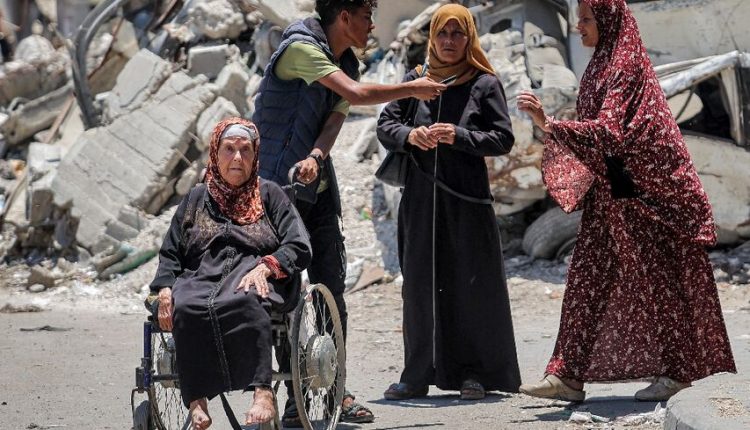Palestinians flee as Israeli forces return to Gaza’s north
GAZA STRIP – Palestinians fled eastern Gaza City on Thursday (27) under heavy bombardment as the Israeli military issued an evacuation order for the area it had previously declared clear of Hamas militants.
The flare-up in the northern Gaza Strip’s Shujaiya district, which witnesses and medics said caused numerous casualties, comes as fears grow of a wider regional conflagration involving Israel and Lebanese Hezbollah, a Hamas ally.
Israeli Defence Minister Yoav Gallant, on a visit to Washington to discuss the Gaza war and ways to avoid broader conflict in the Middle East, warned Hezbollah that fighting on a massive scale would send Lebanon “back to the Stone Age”.
With cross-border tensions between Israel and Iran-backed Hezbollah rising, Gallant said, “We do not want war, but we are preparing for every scenario.”
In Gaza, fighting has ground on despite comments Sunday by Israeli Prime Minister Benjamin Netanyahu that the “intense phase” of the war – now nearing its 10th month – was winding down.
The civil defence agency in the Hamas-run territory and medics said Israeli strikes overnight and early Thursday killed at least five people in Gaza City and another in Beit Lahia, also in the north.
The Israeli military said it had “attacked terrorists who were in a school complex in Khan Yunis” in the south.
In Gaza City, a witness in Shujaiya who declined to be named told AFP the situation was “very difficult and frightening” as Israeli military vehicles approached the area amid air strikes and shelling.
“Residents are running through the streets in terror… a number of wounded and martyrs lie in the streets.”
The military’s Arabic-language spokesman, Avichay Adraee, told residents and displaced Gazans in the Shujaiya area to leave “for your safety”, in a message posted on social media.
They were asked to head south, to a declared “humanitarian zone” about 25 kilometres (15 miles) away.
An AFP photographer saw many leaving on foot, carrying their belongings as they walked through rubble-strewn streets.
Muhammad Ghurab, a doctor at Gaza City’s Al-Ahli hospital, said the facility had so far received seven “martyrs including four children” and more than 40 others who were wounded “as the Israeli forces advanced to the east of Shujaiya neighbourhood”.
Hamas’ press office reported “a significant displacement of residents” around the Shujaiya market.
Shujaiya resident Omar Sukar said the violence began as Gazans were collecting drinking water, which has been in limited supply due to an Israeli siege.
“People were filling water in the Shabura area in Shujaiya,” he told AFP. “The water truck had just arrived when the shelling began.”
Beyond the evacuation order announced by Adraee, the military declined to comment on the fighting.
The war started with Hamas’s October 7 attack on southern Israel, which resulted in the deaths of 1,195 people, mostly civilians, according to an AFP tally based on Israeli figures.
The militants also seized 251 hostages, 116 of whom remain in Gaza although the army says 42 are dead.
Israel’s retaliatory offensive has killed at least 37,765 people, also mostly civilians, according to data from Gaza’s health ministry.
Israel in early January announced it had dismantled “Hamas’s military framework” in Gaza’s north, which saw the most intense fighting in the early stages of the war, but militants have since regrouped.
The war and siege have triggered a dire humanitarian crisis, with Gaza hospitals struggling to function, and food, water and other essentials hard to come by as the vast majority of the territory’s 2.4 million people have been displaced.
Months of talks towards a truce and hostage release deal have so far failed as Israel has rejected Hamas’ demands for a permanent end to fighting and full troop withdrawal.
US officials have voiced hope a Gaza ceasefire could also lead to a reduction in hostilities between Israel and Hezbollah, which have traded near daily cross-border fire since early October.
But tensions have surged as Israel said this month that its war plans were ready, sparking threats from Hezbollah that, in the event of all-out war, none of Israel would be safe.
UN humanitarian coordinator Martin Griffiths said a full war would be “potentially apocalyptic”.
Germany has joined Canada in advising its citizens in Lebanon to leave the country, reiterating warnings first issued shortly after October 7.
In the latest clashes on Thursday, Lebanese state-run media reported a drone strike that hit a motorbike in the country’s east, and several more attacks in the south.
Hezbollah announced the death of one of its fighters as well as an attack on an Israeli army position.
A US official said Washington believed that no side sought a “major escalation”.
Meanwhile, in the first medical evacuation from Gaza in nearly two months, 21 cancer patients left through the Kerem Shalom crossing on the Israeli border, a medical source in Egypt’s El-Arish city said.
It was the first evacuation since the closure of the Rafah border crossing — a key conduit for aid into Gaza — when Israeli forces took over its Palestinian side in early May.
Israel on Thursday dismissed a UN-backed report that said nearly half a million Gazans faced “catastrophic” hunger, calling the assessment “misleading”.
The UN’s World Food Program has said the Integrated Food Security Phase Classification report “paints a stark picture of ongoing hunger”.
Government spokesman David Mencer said “claims regarding starvation… are baseless” and designed to “exert pressure on Israel”.
-AFP



Comments are closed, but trackbacks and pingbacks are open.